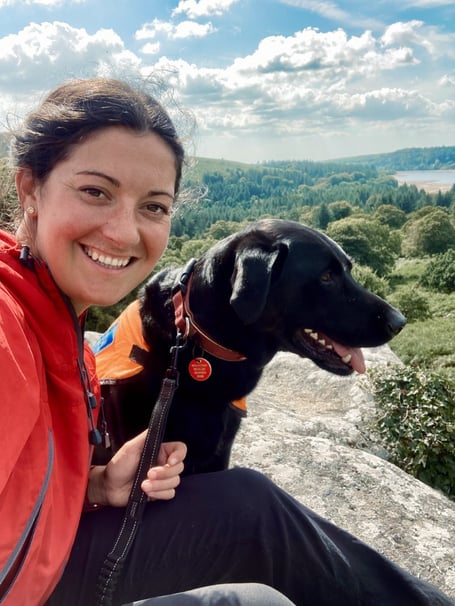A GRITTY Dartmoor search and rescue dog handler has told of her third attempt at ‘Britain’s most brutal’ ultra-marathon.
Jenny Doe, 33, a member of the North Dartmoor Search and Rescue Team, started the annual Spine Race - widely regarded as one of the world’s toughest endurance races.
However, for the third year, she failed to finish the 108-mile (176km) route due to a bout of sickness which caused her to pull out about half way through, despite struggling to battle on.
Jenny, an osteopath, said: ‘The race is a truly epic challenge that tests physical resilience and mental fortitude.’
She ran from the Peak District to the Yorkshire Dales along the Pennine Way, experiencing the full intensity and ferocity of the British winter in one of the biggest physical challenges of her life.
But Jenny is not daunted by her third failure and is considering trying again in 2025 after a year’s break - she is determined to complete it the next time, motivated to achieve the goal of the finish line and also to raise more funds for the team to buy a new incident control van to co-ordinate rescue operations on-site.
She said: ‘Although I didn’t finish again, the frustration of failure is alleviated by the generosity of all the kind people who donated to my Just Giving page which has so far raised £350 for the team.
‘It’s aggravating that I was doing really well running fast and making far better progress than on my previous attempts. I was five hours faster to the checkpoint than last year. I was on target to finish in a really good time. There’s a cut-off at 60 hours, so they take you off the hills if you haven’t finished by then.
‘It’s so tough that only three women finished and many men drop out or don’t make the cut-off. Last year I was leading the women’s field, but had to drop out due to injury. Not a single woman finished. This year half the women dropped out, me included.
Jenny was forced out of the race by a sprained ankle and knee in her previous Spine attempts.
This time the weather was again bad, with 50mph winds blowing hail into her face, but her body let her down. She became so weak and ill, it took her two hours to struggle only five km. Then she was violently sick at the next checkpoint and had to drop out at 83km and after 16 hours running.
‘There’s nothing obvious I can think of that caused it. It was so debilitating and unpexpected and sudden. Nothing much stops me running, except the terrain. But I couldn’t manage anything more than a slow walk. I’ll give it a year’s break and then try again. Surely nothing else can go wrong!’
Entrants have to carry survival kit with them with compulsory items like a bivouac (a temporary shelter, rather than a tent) which is light weight and quick to put up and take down for race. They have to sleep outside and are only allowed on night’s sleep indoors - at a hostel. Jenny said she managed only two hours’ sleep outside. They started on Saturday at 8am last weekend (January 14) with a target to finish three days later before Monday at 6pm. They started at Edale and the finish was at Hawes.
‘It’s all true about how tough it is, not just physically, but on your mind. You have to think positively all the time. Many people are runners who have to learn all the mountain craft such as self-navigation and survival. But I already know about safety and survival, so I had to achieve fitness and I did some with my dog Angus.’


.jpeg?width=209&height=140&crop=209:145,smart&quality=75)
-with-lightning).jpeg?width=209&height=140&crop=209:145,smart&quality=75)

Comments
This article has no comments yet. Be the first to leave a comment.